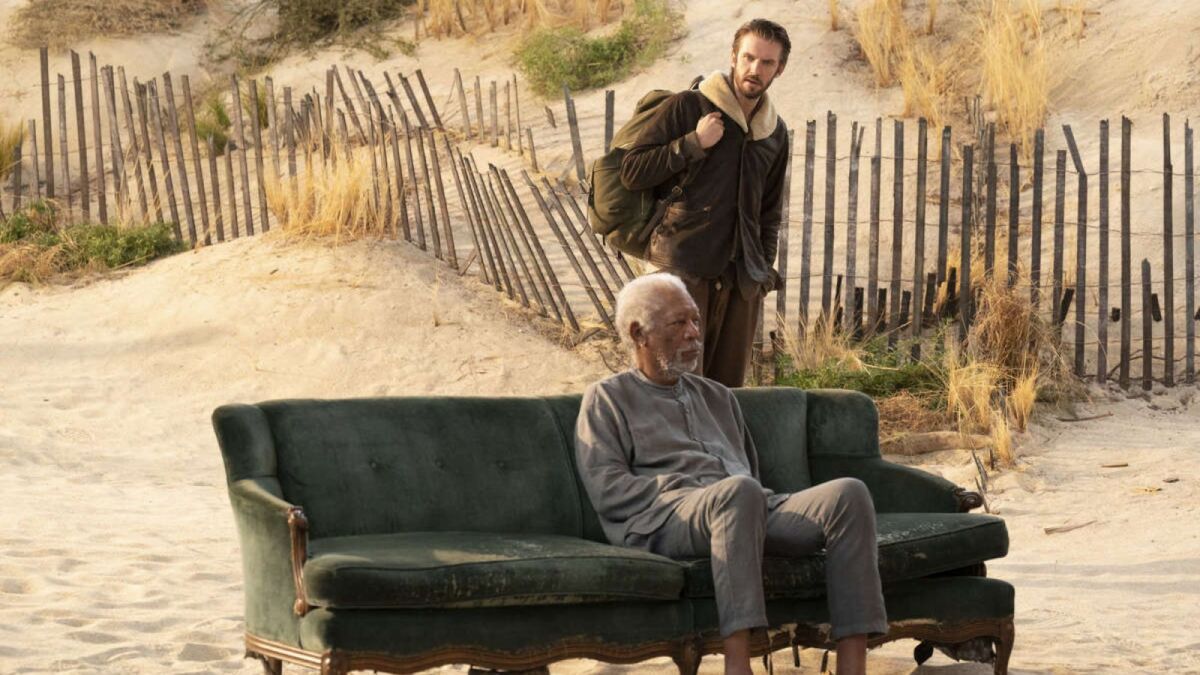Episodic anthologies have been a notable presence within the landscape of pop culture ever since shows like The Twilight Zone first appeared on the small screen. As far as more recent shows go, the dystopic Black Mirror has been well received by critics and general viewers alike, while Love, Death and Robots portrays strange and unique worlds from some of the more underrated short stories in sci-fi and fantasy. However, not every anthology can have the same resounding success, and Amazon’s new effort Solos is one such example.
Created by David Weil, each of Solos’ seven episodes lasts anywhere from twenty minutes to half an hour. Each episode focuses on a character and a particular event in their lifetime, like a senior citizen exploring the farthest reaches of space, or a time traveller talking with versions of themselves from the past or future.
Considering the show focuses on themes of science fiction and drama, most people will instantly compare it to Black Mirror, and while some of the ideas in each of the episodes may take some inspiration from it, they are vastly interesting, sometimes unique as concepts. However, the formatting of each episode might leave some viewers feeling very disengaged.
Each episode is usually filmed in one set, as well as only having two, sometimes more characters. Each story typically follows a conversation between these individuals. It’s very dialogue heavy with very little else to offer and the show likes to take it’s time in terms of the pacing. Some viewers will find it interesting to see these characters explore their humanity – a couple of these characters usually deal with having to face their mortality or the reality of the world around them – however, others may find it equally boring, as it’s literally just people talking. It’s a show which needs your full and undivided attention to to get anything from it.
One of the most notable aspects of this show is all the names working behind it. It’s interesting to note how Zach Braff from Scrubs served as a director here, but Solos also has a star-studded cast – Anne Hathaway, Morgan Freeman, Helen Mirren and Uzo Aduba are just some of the people involved on this project. Also, interesting to note how this is Anthony Mackie’s second go in a futuristic anthology show, after his appearance in season 5 of Black Mirror. All of these actors do their best with a limited script that doesn’t offer much outside of speaking, and though there are very few moments of stellar acting that standout to me, Uzo Aduba’s performance was my personal favourite, soliloquising and acting to the best of her ability.
With the writing focusing predominantly on the conversations or monologues these characters have, as well as only having one setting per story, the episodes feel more like theatre pieces than tangible short films. This is especially true for the first four episodes, but it’s also very easy to spot the inspiration from Black Mirror, featuring dark stories of humans interacting with futuristic technology.
Much more interesting, however, is how the COVID-19 pandemic has clearly affected the production of Solos – most of the sets used feel very tight and claustrophobic, and the episode ‘Sasha’ accurately summarises the paranoia and fear of the outside world that many of us will be all too familiar with, focusing on a woman living in an AI controlled house as an unknown virus tears the outside world apart. However, the tonal shift between the first four episodes to the last three changes so hard, it can easily give the viewer whiplash.
With the character’s dialogues and monologues being the predominant focus of the whole show, the fate of Solos all hangs in the writing, and admittedly, there are some moments when it does shine through. There were some nice bits of comedy, like Helen Mirren breaking the fourth wall by saying “I always wanted to be a star”, or the fact that people have an ‘Asshole Quotient’ that is considered when replicating an identical robot in their image.
As for emotional moments, it does have some that felt poignant – a daughter listening to her mum humming a tune before she is erased from existence, or one of the characters having all memories of his mother literally stolen from him. However, there is so much dialogue that it feels heavy and bloated. Show, don’t tell is the golden rule of television and film, and having the characters literally tell the story to the audience isn’t going to necessarily work, even if the settings are noteworthy.
Solos is going to be very hit or miss for anyone who decides to watch it. On the one hand, there are going to be people in the audience who enjoy the unique concepts the show brings up, as well as enjoy the conversations of each of the characters. However, there are going to be people who will not like watching this, as when you boil it down to basics, it’s just people talking and talking and talking some more. It could have perhaps done better if it was a bit more fleshed out, if the actors had more room to act, or if there was simply more going on to keep the viewers’ attention.
READ MORE: 10 Shows Black Mirror Fans Are Guaranteed To Love
Some of the coverage you find on Cultured Vultures contains affiliate links, which provide us with small commissions based on purchases made from visiting our site. We cover gaming news, movie reviews, wrestling and much more.




